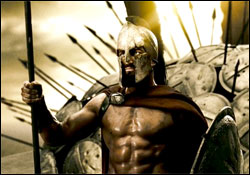 |

Leonidas was a king of Sparta, the 17th of the Agiad line, one of the sons of King Anaxandridas II of Sparta, who was believed
to be a descendant of Heracles. Leonidas was one of three: he had an older brother Dorieus and a younger brother Cleombrotus,
who ruled as regent for a while on Leonidas death before being taken over as regent by Pausanias who was Cleombrotus son.
Leonidas succeeded his half-brother Cleomenes I, probably in 489 or 488 BC, and was married to Cleomenes' daughter, Gorgo.
His name was raised to heroic status as a result of the events in the Battle of Thermopylae.n 480 BC, Leonidas went to Thermopylae
with 300 of his personal guard, all with sons to carry on their names, where he was joined by forces from other Greek city-states,
who put themselves under his command to form an army 7,000 strong. This force was assembled in an attempt to hold the pass
of Thermopylae against hundreds of thousands of Persian soldiers who had invaded from the north of Greece under Xerxes I.
Leonidas took only his personal guard, and not the army, because Spartan religious customs forbade sending an army at that
time of year. In addition, the Oracle of Delphi had foretold that Sparta could be saved only by the death of one of its kings,
one of the lineage of Heracles.
The little Greek force, attacked from both sides, was cut down to a man except for the Thebans, who surrendered. Leonidas
was killed, but the Spartans retrieved his body and protected it until their final defeat. The tomb of Leonidas lies today
in the northern part of the modern town of Sparta.
|